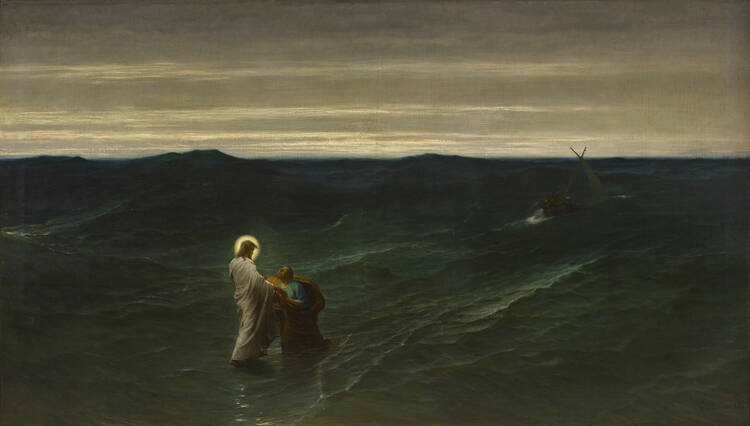A Reflection for the 19th Sunday in Ordinary Time
Readings: 1 Kings 19:9a, 11-13a Romans 9:1-5 Matthew 14:22-33
Are we ever really in control of our lives? We do not enter this world or depart from it on our own terms. Whatever the circumstances of our births or deaths, we come forth from mystery and return to it. It is odd that we fancy ourselves to be in charge, especially when we consider that the first and last ages of life, childhood and seniority, are essentially defined by our lack of control. Remember when the Carpenters sang,
Bless the beasts and the children
For in this world they have no voice
They have no choice.
For every spoiled child there are countless kids whose health and welfare lie with those who will not or cannot care for them. Is that what makes kids and old people natural allies? Because both must accept what they would not, and both must often suffer what they should not?
Given our desire to be in control, we have always feared the storm. Like Elijah, our ancestors fled into caves when they were assailed by the world, when it withdrew its blessings and seemed bent upon their destruction. We do not live in nature as they once did. Thermostats and solid construction are constants of modern life, though, even now, any of us can emerge from shelter only to see everything else swept away.
Once again, the Scriptures start with an external reality and ask us to ponder something deeper. Here, those personal storms that swell into our lives, reminding us that we have never been in control. When such a storm comes, we want to ask what we did wrong. This must be some fault of ours. We are being treated this way because of something we have done wrong, something we have failed to do.
Certainly, we have many faults; we make many mistakes, but those are not the fatal flaw. No, the great fault is always a forgetfulness. We forget that, in the words of our prayer, “we live and move and have our being” in God. The life, death and resurrection of Jesus Christ, the origin of all that is, the destiny of all that is yet to be, has revealed to us the inner depth of reality: We are loved. It takes a lifetime of prayer, struggle and grace to accept this truth and to live confidently within it. Storms try our faith; they must not triumph over it.
There are such simple stories in Scripture, such profound insight. Sometimes, like Elijah, we can shelter from the storm and await the kindness of God that surely follows. At other times, we are like Peter. The air does not simply assail the land. The sky and the sea become as one, a maelstrom without measure, overthrowing everything we thought that we knew.
Like Peter, we might envy the one who walks on water, thinking that more control of our lives is all that we need. Christ does not throw us to the waves. He only bids us come to him. Like Peter, we sometimes take our eyes away from Jesus. Then, they can fill with terror, and the waves overwhelm our little faith. Then, all that we can do is to imitate Peter and cry out to our Christ, “Lord, save me.”
Catholics retain a very ancient Christian practice. We cross ourselves. Pretty silly to do it before a free-throw, but it is quite natural gesture when we are overwhelmed. We trace the sign of the cross on the brows of infants about to be baptized, and we imprint it with oil on the foreheads of those who are dying. It should remind us that we are not in control, and it should do more than that. It should remind us who is. We sign ourselves with the cross of Christ, the great revelation of God’s love. Jesus alone can still the waves.









